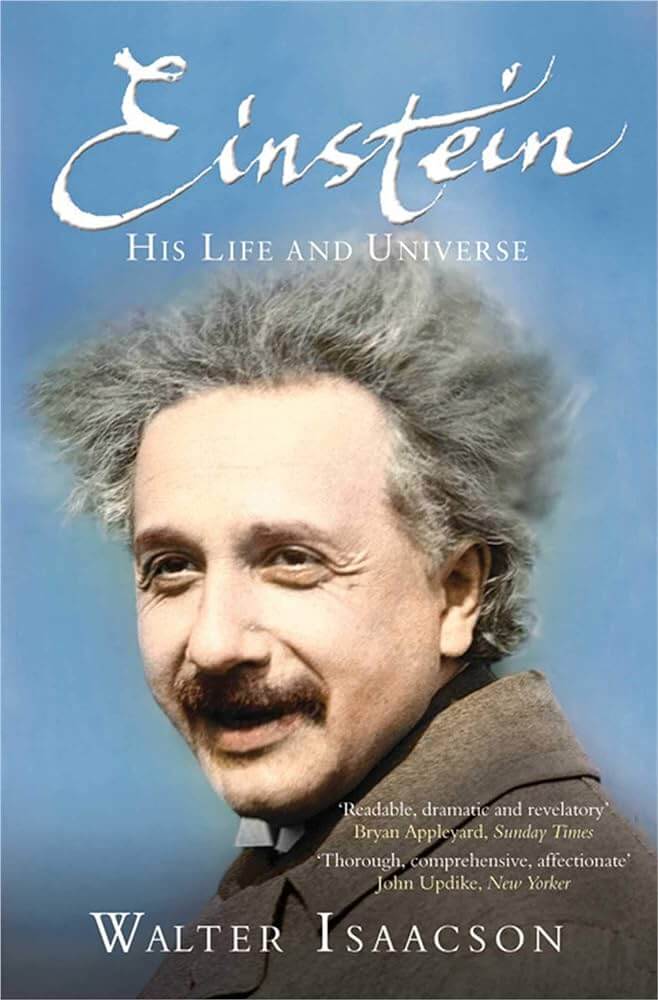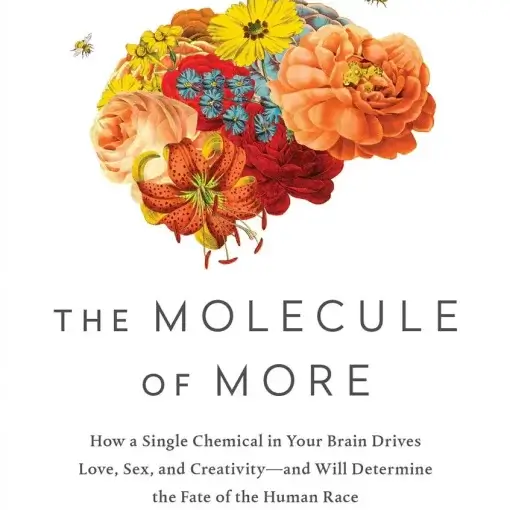
Understanding the minds behind our world’s greatest discoveries can transform how we perceive innovation and progress. At the heart of 20th-century scientific revolution stands Albert Einstein, a name synonymous with genius and curiosity.
His theories redefined our understanding of space, time, and energy. Walter Isaacson’s biography “Einstein: His Life and Universe” offers an unprecedented glance into the life of this iconic physicist through meticulous research blended with compelling narrative.
You’re about to uncover not just the story of a man who could see deeper into the fabric of reality than most but also gain insights into the quirks and qualities that fueled his brilliance.
Published in 2007, this book crystallizes Einstein’s journey from obscure patent clerk to Nobel Prize laureate whose ideas ignited imaginations worldwide—a testament to human intellect’s boundless potential.
Ready for an adventure into genius? Let’s delve in!
Key Takeaways
- Walter Isaacson wrote a biography about Albert Einstein called “Einstein: His Life and Universe.” It tells the story of Einstein’s life and how he changed science with his ideas.
- The book talks about both Einstein’s personal life and the big things he did in physics, like coming up with the theory of relativity. It also shows how he thought differently from others.
- People like this book because it explains complicated science things in a way that is easy to understand. But some wish it went deeper into his theories.
- Einstein didn’t just do important work in science; he also cared a lot about making the world better for everyone. He stood up for peace and civil rights.
- Today, we still use many of Einstein’s ideas in technology, like GPS systems. Scientists keep studying his theories to learn more about our universe.
About the Author, Walter Isaacson
Walter Isaacson is a renowned biographer and journalist known for his in-depth explorations of influential figures. With a background in history and journalism, he has written several notable works on individuals such as Steve Jobs, Benjamin Franklin, and Leonardo da Vinci.
His expertise lies in presenting compelling narratives about the lives and contributions of iconic personalities.
Background and credentials
Walter Isaacson has a knack for telling the stories of great minds. He’s an American historian and journalist with a talent for digging deep into the lives of people who changed the world.
His work on biographies is famous, especially his books about Benjamin Franklin and Steve Jobs. These books show how well he understands big ideas and important people.
This author doesn’t just list facts about someone’s life; he makes you feel like you know them personally. In “Einstein: His Life and Universe,” he uses this skill to show us not only what Einstein did but also who he was as a person.
Isaacson pulls back the curtain on Albert Einstein’s life, helping history buffs see the man behind all those smart theories. This biography by Isaacson isn’t just another book – it’s a chance to walk in Einstein’s shoes.
Other notable works
Walter Isaacson, in addition to his biography of Albert Einstein, has also produced other notable works. His biographies include those of Benjamin Franklin and Steve Jobs, both well-received for their detailed exploration of the lives and impact of these influential figures.
Isaacson’s writing style is known for its ability to bring historical characters to life, offering insight into their personal quirks and motivations. This approach makes his biographies engaging reads that appeal not only to history enthusiasts but also to those interested in human stories and the forces that shape our world.
Isaacson’s diverse bibliography also includes “The Innovators: How a Group of Hackers, Geniuses, and Geeks Created the Digital Revolution,” which examines the contributions of inventors who played key roles in shaping the digital age we live in today.
Overview of \”Einstein: His Life and Universe\”
“Walter Isaacson’s biography of Albert Einstein, ‘Einstein: His Life and Universe,’ delves into the life and mind of one of history’s most influential physicists. The book provides a comprehensive look at both the personal and professional aspects of Einstein’s life, offering insights into his character, personality, and scientific discoveries.”.
Themes and key points
Walter Isaacson’s biography, “Einstein: His Life and Universe,” delves into the themes of curiosity, perseverance, and imagination that defined Albert Einstein. It explores Einstein’s rebellious nature and how it influenced his imaginative scientific work.
The book highlights the impact of Einstein’s theories on theoretical physics and their continuing relevance in modern science and society. Through engaging storytelling, Isaacson provides a comprehensive look at both the personal and professional achievements of this iconic scientist, offering readers a deep understanding of the man behind the scientific genius.
The key points in “Einstein: His Life and Universe” revolve around portraying Albert Einstein not just as a prominent physicist but also as a complex individual with distinctive character traits.
Walter Isaacson’s writing provides insight into Einstein’s intellectual journey while discussing his discovery of the theory of relativity, emphasizing its influence on science and society.
Criticisms and praise
Walter Isaacson’s biography of Albert Einstein, “Einstein: His Life and Universe,” has received widespread acclaim for its comprehensive portrayal of the renowned physicist. The book is praised for providing a deep understanding of Einstein’s personal and professional life, shedding light on his rebellious nature and profound scientific contributions.
Critics laud Isaacson’s ability to capture the essence of Einstein’s character, making the complex concepts accessible to readers with an engaging storytelling style. However, some have criticized the book for occasionally lacking in-depth exploration of certain scientific theories and for skimming over intricate details related to Einstein’s work.
The biography delves into the enigmatic mind behind one of history’s most influential physicists while also exploring his impact on modern science. It provides an insightful look at how a rebellious yet imaginative nature shaped Einstein’s scientific achievements, making it appealing to both history lovers and those fascinated by groundbreaking discoveries in physics.
The Life of Albert Einstein
Born in Germany, Albert Einstein was a theoretical physicist known for developing the theory of general relativity, and he made significant contributions to the development of quantum mechanics.
His personal life and legacy are equally fascinating, with his work still impacting science and society today.
Early years and education
Albert Einstein was born in 1879 in Ulm, Germany. His parents owned an electrical equipment business and moved to Munich when he was a baby. As a child, Einstein showed little interest in traditional schooling methods.
He had speech challenges and struggled with the structured environment of school, which led his teachers to believe he wasn’t very bright.
When he was five years old, Einstein’s father showed him a compass, sparking his curiosity about the invisible forces that govern the natural world. This early fascination laid the foundation for his future scientific inquiries into the mysteries of physics.
Albert enrolled at the Swiss Federal Polytechnic School at age 16, where he excelled in mathematics and physics but clashed with authority figures. Despite these difficulties, Einstein graduated as a teacher of mathematics and physics.
Career and achievements
Albert Einstein, a renowned mathematician, made significant contributions to science in his career. His theory of relativity revolutionized the understanding of space, time, and gravity.
In 1921, he received the Nobel Prize for Physics for his explanation of the photoelectric effect. Additionally, Einstein’s formula E=mc² became a fundamental principle in physics and led to important advancements in nuclear energy research.
Einstein’s life was filled with groundbreaking achievements; he also played a crucial role in the development of quantum theory and statistical mechanics. Furthermore, as an outspoken advocate for civil rights and peace, Einstein used his influence to support humanitarian causes throughout his lifetime.
Personal life and legacy
Albert Einstein was more than just a brilliant physicist. He was also known for his personal life and legacy. Einstein married twice and had three children. He left Germany when Adolf Hitler came to power, settling in the United States.
Despite being known for his scientific achievements, he also advocated for civil rights and pacifism, leaving behind a legacy as a humanitarian.
Einstein’s impact on science and society has been profound, continuing to influence physicists and thinkers today. His theories revolutionized our understanding of space, time, energy, and matter.
Even after his death in 1955, Einstein remains an iconic figure whose ideas continue to shape modern physics.
Impact of Einstein’s Theories and Ideas
Einstein’s theories and ideas have had a profound impact on science and society, shaping our understanding of the universe and leading to groundbreaking developments in technology.
His work continues to be relevant today, inspiring new generations of scientists and innovators.
Influence on science and society
Einstein’s theories transformed our understanding of the universe. His theory of relativity paved the way for groundbreaking discoveries in physics and cosmology, including nuclear energy and black holes.
Moreover, his work continues to inspire new generations of scientists, pushing the boundaries of human knowledge.
Einstein’s impact extended beyond science; he became a cultural icon known for his advocacy for peace, civil rights, and education. His ideas have permeated popular culture, influencing literature, art, and even philosophy.
Continuing relevance
Einstein’s theories continue to shape our understanding of the universe and have practical applications in modern technology. His work on the photoelectric effect laid the groundwork for many devices we use today, such as solar panels and photodetectors.
Moreover, his theory of relativity has had profound impacts on GPS technology, ensuring its accuracy. Additionally, his ideas about the nature of space and time still challenge and inspire physicists today, driving ongoing research into fundamental aspects of the cosmos.
Furthermore, Einstein’s legacy extends beyond science; his advocacy for civil rights and pacifism resonates with contemporary social movements. His belief in global cooperation and intellectual freedom remains relevant in promoting a more equitable and peaceful world.
Conclusion
In conclusion, Walter Isaacson’s non-fiction biography “Einstein: His Life and Universe” provides an in-depth exploration of Albert Einstein’s life and scientific contributions. The book offers a comprehensive look at the man behind the scientific genius and his remarkable impact on the field of physics.
Through Isaacson’s engaging storytelling, readers gain insight into Einstein’s rebellious nature and the imagination that distinguished his work. This definitive biography not only covers factual details but also delves into Einstein’s character, personality, and the nature of his scientific discoveries.
Published in 2007, it continues to be acclaimed as a compelling portrayal of one of history’s most influential physicists.
FAQs
1. What kind of book is “Einstein: His Life and Universe”?
“Einstein: His Life and Universe” by Walter Isaacson is a nonfiction book. It tells the story of Albert Einstein’s life.
2. Can I learn about Einstein’s discoveries in this book?
Yes, you can read about Einstein’s big ideas and how he found them in this book.
3. Will “Einstein: His Life and Universe” tell me what Einstein was like as a person?
The book gives details on both his work and what he was like outside of being a scientist, so you’ll get to know him well.
4. Is “Einstein: His Life and Universe” easy to understand?
Walter Isaacson wrote the book to share Einstein’s story with many people, so it explains things simply enough for most readers to follow along.




